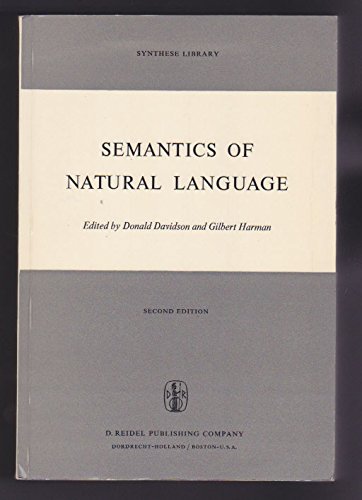Items related to Semantics of natural language (Synthese library)

"synopsis" may belong to another edition of this title.
- PublisherReidel
- Publication date1972
- ISBN 10 9027701954
- ISBN 13 9789027701954
- BindingHardcover
- Edition number1
- Number of pages769
Shipping:
US$ 14.84
From United Kingdom to U.S.A.
Top Search Results from the AbeBooks Marketplace
Semantics of Natural Language
Book Description Condition: Poor. This is an ex-library book and may have the usual library/used-book markings inside.This book has hardback covers. Book contains pen markings. In poor condition, suitable as a reading copy. No dust jacket. Please note the Image in this listing is a stock photo and may not match the covers of the actual item,1350grams, ISBN:9027701954. Seller Inventory # 8860413
Naming and Necessity'. Pp. 251-355 in: Semantics of Natural Language.
Book Description Hardcover. Condition: Near Fine. Dust Jacket Condition: Near Fine. 1st Edition. FIRST EDITION. x, 769 pp. Original cloth. Very Good+, in very good+ dust jacket. Synthese Library, Vol. 40. 'Kripke's most important philosophical publication . based on transcripts of three lectures he delivered at Princeton in 1970, [it] changed the course of analytic philosophy. It provided the first cogent account of necessity and possibility as metaphysical concepts, and it distinguished both concepts from the epistemological notions of a posteriori knowledge and a priori knowledge (knowledge acquired through experience and knowledge independent of experience, respectively) and from the linguistic notions of analytic truth and synthetic truth, or truth by virtue of meaning and truth by virtue of fact (see analytic proposition). In the course of making these distinctions, Kripke revived the ancient doctrine of essentialism, according to which objects possess certain properties necessarily without them the objects would not exist at all. On the basis of this doctrine and revolutionary new ideas about the meaning and reference of proper names and of common nouns denoting 'natural kinds' (such as heat, water, and tiger), he argued forcefully that some propositions are necessarily true but knowable only a posteriori e.g., 'Water is H2O' and 'Heat is mean molecular kinetic energy' and that some propositions are contingently true (true in some circumstances but not others) but knowable a priori. These arguments overturned the conventional view, inherited from Immanuel Kant (1720 1804), that identified all a priori propositions as necessary and all a posteriori propositions as contingent. Naming and Necessity also had far-reaching implications regarding the question of whether linguistic meaning and the contents of beliefs and other mental states are partly constituted by social and environmental facts external to the individual. According to Kripke's causal theory of reference, for example, the referent of a given use of a proper name, such as Aristotle, is transmitted through an indefinitely long series of earlier uses; this series constitutes a causal-historical chain that is traceable, in principle, to an original, or 'baptismal,' application. Kripke's view posed a serious challenge to the prevailing 'description' theory, which held that the referent of a name is the individual who is picked out by an associated definite description, such as (in the case of Aristotle) the teacher of Alexander the Great. Finally, Kripke's work contributed greatly to the decline of ordinary language philosophy and related schools, which held that philosophy is nothing more than the logical analysis of language' (Encyclopaedia Britannica). Seller Inventory # 18999

